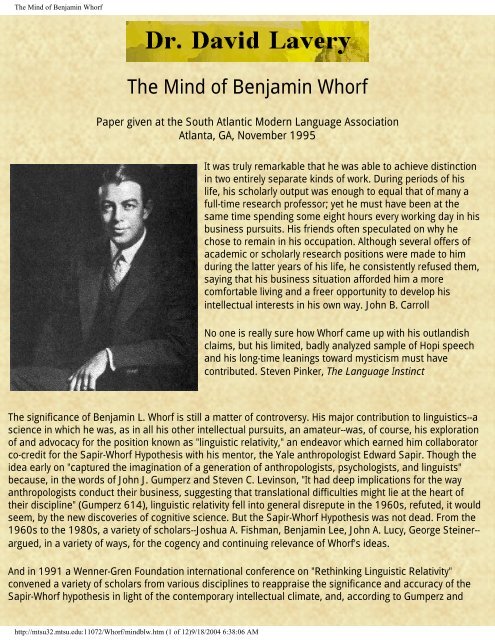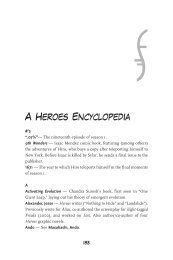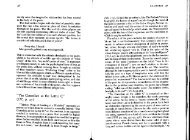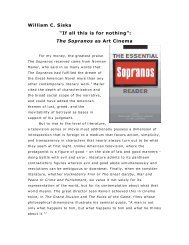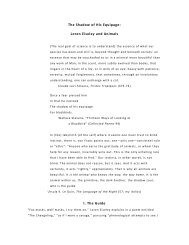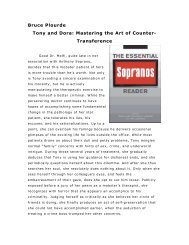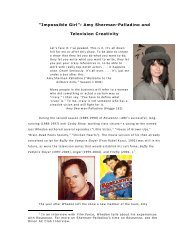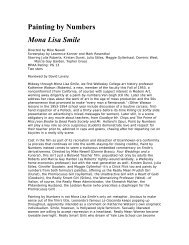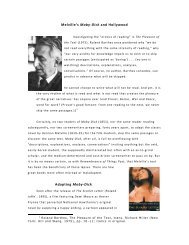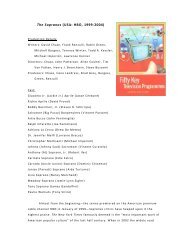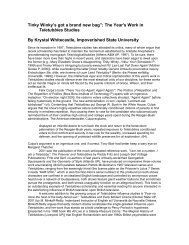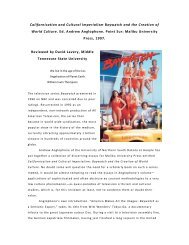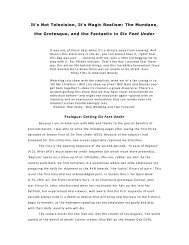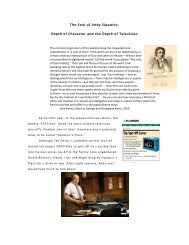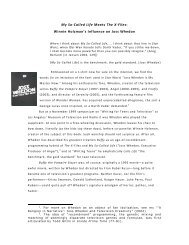The Mind of Benjamin Whorf - David Lavery
The Mind of Benjamin Whorf - David Lavery
The Mind of Benjamin Whorf - David Lavery
You also want an ePaper? Increase the reach of your titles
YUMPU automatically turns print PDFs into web optimized ePapers that Google loves.
<strong>The</strong> <strong>Mind</strong> <strong>of</strong> <strong>Benjamin</strong> <strong>Whorf</strong><br />
<strong>The</strong> <strong>Mind</strong> <strong>of</strong> <strong>Benjamin</strong> <strong>Whorf</strong><br />
Paper given at the South Atlantic Modern Language Association<br />
Atlanta, GA, November 1995<br />
It was truly remarkable that he was able to achieve distinction<br />
in two entirely separate kinds <strong>of</strong> work. During periods <strong>of</strong> his<br />
life, his scholarly output was enough to equal that <strong>of</strong> many a<br />
full-time research pr<strong>of</strong>essor; yet he must have been at the<br />
same time spending some eight hours every working day in his<br />
business pursuits. His friends <strong>of</strong>ten speculated on why he<br />
chose to remain in his occupation. Although several <strong>of</strong>fers <strong>of</strong><br />
academic or scholarly research positions were made to him<br />
during the latter years <strong>of</strong> his life, he consistently refused them,<br />
saying that his business situation afforded him a more<br />
comfortable living and a freer opportunity to develop his<br />
intellectual interests in his own way. John B. Carroll<br />
No one is really sure how <strong>Whorf</strong> came up with his outlandish<br />
claims, but his limited, badly analyzed sample <strong>of</strong> Hopi speech<br />
and his long-time leanings toward mysticism must have<br />
contributed. Steven Pinker, <strong>The</strong> Language Instinct<br />
<strong>The</strong> significance <strong>of</strong> <strong>Benjamin</strong> L. <strong>Whorf</strong> is still a matter <strong>of</strong> controversy. His major contribution to linguistics--a<br />
science in which he was, as in all his other intellectual pursuits, an amateur--was, <strong>of</strong> course, his exploration<br />
<strong>of</strong> and advocacy for the position known as "linguistic relativity," an endeavor which earned him collaborator<br />
co-credit for the Sapir-<strong>Whorf</strong> Hypothesis with his mentor, the Yale anthropologist Edward Sapir. Though the<br />
idea early on "captured the imagination <strong>of</strong> a generation <strong>of</strong> anthropologists, psychologists, and linguists"<br />
because, in the words <strong>of</strong> John J. Gumperz and Steven C. Levinson, "It had deep implications for the way<br />
anthropologists conduct their business, suggesting that translational difficulties might lie at the heart <strong>of</strong><br />
their discipline" (Gumperz 614), linguistic relativity fell into general disrepute in the 1960s, refuted, it would<br />
seem, by the new discoveries <strong>of</strong> cognitive science. But the Sapir-<strong>Whorf</strong> Hypothesis was not dead. From the<br />
1960s to the 1980s, a variety <strong>of</strong> scholars--Joshua A. Fishman, <strong>Benjamin</strong> Lee, John A. Lucy, George Steiner-argued,<br />
in a variety <strong>of</strong> ways, for the cogency and continuing relevance <strong>of</strong> <strong>Whorf</strong>'s ideas.<br />
And in 1991 a Wenner-Gren Foundation international conference on "Rethinking Linguistic Relativity"<br />
convened a variety <strong>of</strong> scholars from various disciplines to reappraise the significance and accuracy <strong>of</strong> the<br />
Sapir-<strong>Whorf</strong> hypothesis in light <strong>of</strong> the contemporary intellectual climate, and, according to Gumperz and<br />
http://mtsu32.mtsu.edu:11072/<strong>Whorf</strong>/mindblw.htm (1 <strong>of</strong> 12)9/18/2004 6:38:06 AM
<strong>The</strong> <strong>Mind</strong> <strong>of</strong> <strong>Benjamin</strong> <strong>Whorf</strong><br />
Levinson's published summary, the symposium established a possible "intermediate position" for<br />
acceptance <strong>of</strong> linguistic relativity. Not surprisingly, a 1992 article in Scientific American proclaimed "New<br />
Who<strong>of</strong> in <strong>Whorf</strong>: An Old Language <strong>The</strong>ory Regains Its Authority."<br />
And yet, in the "linguistic wars" <strong>of</strong> this century (as Randy Allen Harris has called them), the theory remains<br />
extremely controversial. Recently, <strong>Whorf</strong>'s scholarship has come under attack. In <strong>The</strong> Language Instinct,<br />
Steven Pinker sc<strong>of</strong>fs sarcastically at <strong>Whorf</strong>ian notions and dismisses them as non-sequiters unworthy <strong>of</strong> any<br />
future serious consideration. And anthropologist Laura Martin and linguist Ge<strong>of</strong>frey Pullam have disdainfully<br />
dismissed the well known <strong>Whorf</strong>ian example <strong>of</strong> multiple Eskimo words for snow as little more than an urban<br />
legend.<br />
I am not here today to attack or defend <strong>Whorf</strong> or linguistic relativity. My purpose is at once both more simple<br />
and more complex. I want to explore <strong>Whorf</strong>'s mind and methods. I am more interested in the creative<br />
process <strong>of</strong> a linguist than I am in linguistics, per se. <strong>Benjamin</strong> Lee <strong>Whorf</strong> was an amateur linguistic, it is true,<br />
but he was as well an amateur evolutionary biologist, botanist, theologian, and physicist, and his advocacy<br />
<strong>of</strong> linguistic relativity cannot be understand separately from his other avocations. Nor can we neglect the<br />
importance <strong>of</strong> his day job, which, as John Carroll has observed, <strong>of</strong>fered <strong>Whorf</strong> "a freer opportunity to develop<br />
his intellectual interests in his own way." Even if one day his ideas are entirely discredited, the achievement<br />
<strong>of</strong> <strong>Benjamin</strong> <strong>Whorf</strong> will remain an intriguing case in the history <strong>of</strong> the creative process.<br />
From 1918 to 1941, the main <strong>of</strong>fice <strong>of</strong> the<br />
Hartford Insurance Company on Asylum<br />
Avenue in Hartford, Connecticut, "a solemn<br />
affair <strong>of</strong> granite, with a portico resting on five<br />
<strong>of</strong> the grimmest possible columns," housed<br />
two most unusual employees. Upstairs in a big<br />
corner <strong>of</strong>fice, a Harvard graduate bond-surety<br />
lawyer, who became (in 1934) a vice-president<br />
<strong>of</strong> the company, and, on the side, wrote<br />
poetry. Downstairs, in the fire insurance<br />
division, a fire prevention specialist, an<br />
engineering graduate <strong>of</strong> the Massachusetts<br />
Institute <strong>of</strong> Technology, who on the side<br />
practiced linguistics.<br />
<strong>The</strong>re is no clear evidence they knew each other, no evidence--other than a misdirected correspondence<br />
concerning language that was mistakently addressed by name to the poet but which did eventually reach<br />
the linguist on the first floor--that they ever became aware, prior to the fire-prevention linguist's death from<br />
cancer in 1941, <strong>of</strong> each other's avocations. <strong>The</strong> bond-surety poet was thirty nine years old when the fire<br />
prevention-linguist, eighteen years his junior, joined the company. He would outlive him by fourteen years.<br />
http://mtsu32.mtsu.edu:11072/<strong>Whorf</strong>/mindblw.htm (2 <strong>of</strong> 12)9/18/2004 6:38:06 AM
<strong>The</strong> <strong>Mind</strong> <strong>of</strong> <strong>Benjamin</strong> <strong>Whorf</strong><br />
While the bond-surety poet was still a young man, a Parisian stockbroker fled business and family to pursue<br />
his own creative vocation in the South Seas. A contemporary <strong>of</strong> both the poet and the linguist, an American<br />
business man, suffered a nervous breakdown and ran away from a successful career to become a writer.<br />
Such desperate acts were, <strong>of</strong> course, quintessentially modernist. For how could a creative individual<br />
possibly nurture art and mind in the midst <strong>of</strong> bourgeois values?<br />
Wallace Stevens and <strong>Benjamin</strong> <strong>Whorf</strong> were not, however, Paul Gauguin or Sherwood Anderson. <strong>The</strong>y stayed<br />
at work, moonlighting genius, finding ways to contribute to the intellectual life <strong>of</strong> this century while dutifully<br />
doing their job. Like their contemporary Charles Ives, a Connecticut insurance executive-avant garde<br />
composer, they not only discovered the means to pursue the risks <strong>of</strong> avocational creation in an industry<br />
dedicated to the management <strong>of</strong> risk but became, each, in his own way, the ultimate risk takers:<br />
proponents <strong>of</strong> the relativity <strong>of</strong> perception, champions <strong>of</strong> the "real" as imaginary.<br />
Born on April 24, 1897 in Winthrop, Massachusetts, <strong>Benjamin</strong> Lee <strong>Whorf</strong> was the oldest <strong>of</strong> three sons <strong>of</strong><br />
Harry, a commercial artist who experimented with playwriting and stage design, and Sarah Lee <strong>Whorf</strong>. <strong>Whorf</strong><br />
graduated from Winthrop High School in 1914 and went on to MIT, receiving a B.S. in chemical engineering<br />
in 1918.<br />
After graduation, <strong>Whorf</strong> joined the Hartford Fire Insurance Company as a trainee in fire prevention<br />
engineering. Upstairs in the same building, Wallace Stevens, perhaps the greatest American poet <strong>of</strong> the<br />
century, presided over the surety bonds division and became vice-president <strong>of</strong> the company. <strong>The</strong>re is no<br />
evidence they knew each other. <strong>Whorf</strong> remained with the Hartford for the rest <strong>of</strong> his short life, developing a<br />
national reputation as an expert in industrial fire prevention and authoring several articles on the subject,<br />
including one, "Blazing Icicles," that <strong>of</strong>fered a linguistic interpretation <strong>of</strong> fire prevention.<br />
A childhood love for ciphers and puzzles, and wide sparetime reading and directed self-study in a number <strong>of</strong><br />
fields, led to the development <strong>of</strong> a pr<strong>of</strong>ound avocational interest in linguistics, pursued in <strong>of</strong>f hours and on<br />
business trips. Under the influence <strong>of</strong> the French mystic Fabre d'Olivet, himself an amateur linguist whose<br />
great project was to find resurrect the hidden, esoteric meaning <strong>of</strong> biblical texts, and his own strong<br />
religious background (he was a Methodist), his study (including actual field work) <strong>of</strong> American Indian<br />
languages like Aztec, Mayan, and Hopi led to his development <strong>of</strong> a theory <strong>of</strong> "linguistic relativity"--an<br />
approach to comparative linguistics which he shared with Yale anthropologist Edward Sapir.<br />
In the late 1920s he began a prolific correspondence with noted scholars in anthropology, archaeology, and<br />
linguistics, demonstrating a distinct talent for self-promotion as he sought to convince readers that he had<br />
in fact discovered a new frontier <strong>of</strong> human inquiry. In 1931, he even enrolled as a graduate student at Yale<br />
in order to study under Sapir, thus beginning one <strong>of</strong> the most interesting cases <strong>of</strong> intellectual collaboration<br />
in this century, And he began to publish his ideas on linguistics not only in major scholarly journals<br />
(Language, American Anthropologist) but in more popular forums like M.I.T.'s Technology Review. His three<br />
essays in the latter journal--"Science and Linguistics" (1940), "Linguistics as an Exact Science" (1940), and<br />
"Languages and Logic" (1941)--helped to disseminate his ideas widely. During 1940 and 1941, his essays<br />
and reviews on a wide variety <strong>of</strong> topics appeared regularly in the pages <strong>of</strong> the journal Main Current in<br />
Modern Thought. He died <strong>of</strong> cancer on July 26, 1941.<br />
Under the editorship <strong>of</strong> John B. Carroll, many <strong>of</strong> <strong>Whorf</strong>'s most important essays were collected in Language,<br />
http://mtsu32.mtsu.edu:11072/<strong>Whorf</strong>/mindblw.htm (3 <strong>of</strong> 12)9/18/2004 6:38:06 AM
<strong>The</strong> <strong>Mind</strong> <strong>of</strong> <strong>Benjamin</strong> <strong>Whorf</strong><br />
Thought, and Reality, published in 1956 by the M.I.T. Press. He left behind a number <strong>of</strong> manuscripts on an<br />
astonishing range <strong>of</strong> subjects--gravitation, "being," trees, color theory, evolution, a translation <strong>of</strong> Genesis,<br />
large stemmed plants, electromagnetism, the trinity, dreams, a Hopi dictionary--which remain unpublished,<br />
though they are available in <strong>Whorf</strong>'s collected papers housed at Yale.<br />
Creative individuals, Columbia University psychologist Howard Gruber has discovered, possess a "network <strong>of</strong><br />
enterprises," that is, "they become the sort <strong>of</strong> people who can easily handle seemingly different but<br />
intimately related activities. <strong>The</strong>y become highly skilled jugglers" (1981b, 71). ("In the course <strong>of</strong> a single day<br />
or week," Gruber notes, "the activities <strong>of</strong> the person may appear, from the outside, as a bewildering<br />
miscellany. But the person is not disoriented or dazzled. He or she can readily map each activity onto one or<br />
another enterprise" [1989b, 13].) For "in order to make grand goals attainable, the creator must invent and<br />
pursue subgoals." Individuals must find ways <strong>of</strong> managing their tasks through a network <strong>of</strong> enterprises<br />
(1988b, 265). Inherently "dynamic," a network <strong>of</strong> enterprises, Gruber suggests, should be thought <strong>of</strong> as a<br />
"sketch <strong>of</strong> the entire set <strong>of</strong> intrinsic motives regulating the person's work" (1983b, 9), promoting "diverse<br />
simultaneous or parallel activities" (1980a, 311). Such a network is interactive and interdependent (1983b,<br />
9) and typically "includes a scheme for replenishing itself with new tasks if ever the original stock nears<br />
completion" (1983a, 17). In an obituary, <strong>Whorf</strong>'s colleague Herbert Hackett noted that "only the very busy<br />
have time for greatness." And <strong>Benjamin</strong> <strong>Whorf</strong> was very busy, busier almost, than it now appears possible to<br />
imagine.<br />
Gruber has noted that underpinning the creative achievements <strong>of</strong> an individual like Thomas Edison, whose<br />
"network <strong>of</strong> enterprises" seems almost infinitely complex, there may well lie a singular, possibly esoteric,<br />
world view, a generative heuristic that yields different fresh ideas when applied to distinct fields <strong>of</strong> inquiry.<br />
Though not an inventor, <strong>Benjamin</strong> <strong>Whorf</strong>'s "light bulb" seldom stopped going <strong>of</strong>f in his short creative life.<br />
This "tall but frail" man, who "moved and talked deftly and gracefully," spoke with a thick eastern<br />
Massachusetts accent, and accomplished a great deal "without seeming to have great energy" (Carroll 820),<br />
this man who inherited from his mother a "deep sense <strong>of</strong> wonder at the mystery <strong>of</strong> the universe" (Trager<br />
537) and from his father-as-model commitment to a interdisciplinary set <strong>of</strong> intellectual interests, this man<br />
who loved to talk about his sea captain ancestors, waxing eloquent about the exploration <strong>of</strong> unknown lands<br />
(Trager 537), this man who wrote (in a 1927 letter to William Lyon Phelps) <strong>of</strong> "a certain leading tendency <strong>of</strong><br />
mine, which is namely to work toward a reconciliation <strong>of</strong> the modern intellectual world to God," led a life<br />
committed to discovery, dedicated to breaking the cryptogrammatic codes that gloss our ordinary, culturebound<br />
experience <strong>of</strong> the world.<br />
<strong>The</strong> linguistic relativity <strong>Benjamin</strong> <strong>Whorf</strong> championed sought to find "in all those other tongues which by eons<br />
<strong>of</strong> independent evolution have arrived at different, but equally logical, provisional analyses" the necessary<br />
"correctives" to the narrow limitations single language determinism places on the world. As much as his<br />
fellow relativist Einstein, <strong>Whorf</strong> was at heart a cosmologist, seeking to convince his narrow-minded<br />
contemporaries that they must no longer<br />
see a few recent dialects <strong>of</strong> the Indo-European family, and the rationalizing techniques<br />
elaborated from their patterns, as the apex <strong>of</strong> the evolution <strong>of</strong> the human mind, nor their<br />
present wide spread as due to any survival from fitness or to anything but a few events <strong>of</strong><br />
history--events that could be called fortunate only from the parochial point <strong>of</strong> view <strong>of</strong> the<br />
favored parties. <strong>The</strong>y, and our own thought processes with them, can no longer be envisioned<br />
as spanning the gamut <strong>of</strong> reason and knowledge but only as one constellation in a galactic<br />
http://mtsu32.mtsu.edu:11072/<strong>Whorf</strong>/mindblw.htm (4 <strong>of</strong> 12)9/18/2004 6:38:06 AM
<strong>The</strong> <strong>Mind</strong> <strong>of</strong> <strong>Benjamin</strong> <strong>Whorf</strong><br />
expanse. A fair realization <strong>of</strong> the incredible degree <strong>of</strong> diversity <strong>of</strong> linguistic systems that<br />
ranges over the globe leaves one with the inescapable feeling that the human spirit is<br />
inconceivably old; that the few thousand years <strong>of</strong> history covered by our written records are<br />
no more than the thickness <strong>of</strong> a pencil mark on the scale that measures our past experience<br />
on this planet; that the vents <strong>of</strong> these recent millenniums spell nothing in any evolutionary<br />
wise, that the race has taken no sudden spurt, achieved no commanding synthesis during<br />
recent millenniums, but has only played with a few <strong>of</strong> the linguistic formulations and views <strong>of</strong><br />
nature bequeathed from an inexpressibly long past. (LTR 218-219)<br />
Steven Pinker has accused <strong>Whorf</strong> <strong>of</strong> being a closet mystic whose "long-time leanings," coupled with bad<br />
scholarship, produced his "outlandish claims." Pinker is certainly correct that <strong>Whorf</strong> was strongly inclined<br />
toward some very unscientific notions. Though the articles on linguistics published in his lifetime show him<br />
trying to be painstakingly scientific, an examination <strong>of</strong> his other writings, not just the manuscripts in the<br />
<strong>Whorf</strong> papers like "<strong>The</strong> Flux-Outlet <strong>The</strong>ory: A Concrete Representation <strong>of</strong> Gravitation," "Why I Have Discarded<br />
Evolution," "Unanswered Questions from Ancient Times," "On Being," "Concerning Science and Religion," but<br />
all the articles and reviews he wrote for the decidedly non-mainstream "new age" journal Main Currents in<br />
Modern Thought, reveal him to be a decidedly religious thinker, passionately interested in the esoteric, in<br />
the perennial philosophy (as Huxley called), especially as revealed in the developments <strong>of</strong> modern science.<br />
Needless to say, this stance is not entirely absent from Language, Thought, and Reality, in which <strong>Whorf</strong><br />
reveals himself ready to believe that the Hopi concept <strong>of</strong> subjectivity<br />
comprises all that we call future, but not merely this; it includes equally and indistinguishably all that<br />
we call mental--everything that appears or exists in the mind, or as the Hopi would prefer to say, in<br />
the heart, not only the heart <strong>of</strong> man, but the heart <strong>of</strong> animals, plants, and things, and behind and<br />
within all the forms and appearances <strong>of</strong> nature in the heart <strong>of</strong> nature, and by an implication and<br />
extension which has been felt by more than one anthropologist, yet would hardly ever be spoken <strong>of</strong><br />
by a Hopi himself, so charged is the idea with religious and magical awesomeness, in the very heart<br />
<strong>of</strong> the Cosmos itself. (59-60)<br />
and convinced that "thought contracts everything and pervades the universe . . . [and that] . . . like any other<br />
force, leaves everywhere traces <strong>of</strong> effect." "When we think <strong>of</strong> a certain actual rosebush," he writes in "<strong>The</strong><br />
Relation <strong>of</strong> Habitual Thought and Behavior to Language," he writes<br />
we do not suppose that our thought goes to that actual bush, and engages with it, like a searchlight<br />
turned upon it. What then do we suppose our consciousness is dealing with when we are thinking <strong>of</strong><br />
that rosebush? Probably we think it is dealing with a "mental image" which is not the rosebush but a<br />
mental surrogate <strong>of</strong> it. But why should it be natural to think that our thought deals with a surrogate<br />
and not with the real rosebush? Quite possibly because we are dimly aware that we carry about with<br />
us a whole imaginary space, full <strong>of</strong> mental surrogates. To us, mental surrogates are old familiar fare.<br />
Along with the images <strong>of</strong> imaginary space, which we perhaps secretly know to be only imaginary, we<br />
tuck the thought-<strong>of</strong> actually existing rosebush, which may be quite another story, perhaps just<br />
because we have that very convenient "place" for it. <strong>The</strong> Hopi thought-world has no imaginary space.<br />
<strong>The</strong> corollary to this is that it may not locate thought dealing with real space anywhere but in real<br />
space, nor insulate real space from the effects <strong>of</strong> thought. A Hopi would naturally suppose that his<br />
http://mtsu32.mtsu.edu:11072/<strong>Whorf</strong>/mindblw.htm (5 <strong>of</strong> 12)9/18/2004 6:38:06 AM
<strong>The</strong> <strong>Mind</strong> <strong>of</strong> <strong>Benjamin</strong> <strong>Whorf</strong><br />
thought (or he himself) traffics with the actual rosebush--or more likely, corn plant--that he is thinking<br />
about. <strong>The</strong> thought then should leave some trace <strong>of</strong> itself with the plant in the field. If it is a good<br />
thought, one about health and growth, it is good for the plant; if a bad thought, the reverse. (LTR 149-<br />
50)<br />
This is certainly not orthodox scientific thought. <strong>The</strong> acceptance <strong>of</strong> "action at a distance" amounts to nothing<br />
less than scientific blasphemy. But for the most part the <strong>Whorf</strong> <strong>of</strong> Language, Thought, and Reality remains<br />
assiduously, resolutely committed to at least the pretense <strong>of</strong> scientific thinking.<br />
It is not too much to say, however, that the speaker in these essays is, in fact, a kind <strong>of</strong> persona, for in the<br />
unpublished writings <strong>Whorf</strong> <strong>of</strong>ten speaks in a quite different voice. He sounds, and wants to sound, much<br />
more like a polymathic, bricolaging master <strong>of</strong> esoteric knowledge. He aspires there to be, if not quite a<br />
magus, at least a cosmological philosopher committed to the development <strong>of</strong> a comprehensive theory <strong>of</strong><br />
matter and mind that would explain all phenomena. A glance at the projected table <strong>of</strong> contents for his<br />
magnum opus, "Concerning Science and Religion," a book that would explain the mysteries <strong>of</strong> the cosmos-from<br />
the inner life <strong>of</strong> man, to the nature <strong>of</strong> space and time, to God--demonstrates well his aspirations. (You<br />
can find this on your handout.) Or look with me for a moment at <strong>Whorf</strong>'s translation <strong>of</strong> the beginning <strong>of</strong> the<br />
book <strong>of</strong> Genesis (it's on the handout). "Myth," Levi-Strauss once suggested, should be understood as "an act<br />
<strong>of</strong> faith in a science yet unborn." <strong>Whorf</strong>'s reconceptualization <strong>of</strong> Genesis almost seems devoted to pro<strong>of</strong> <strong>of</strong><br />
the French structural anthropologist's contention. Lines and phrases like "phenomenalized was intelligence<br />
throughout all space" and "there was spatial, temporal sinking into mysterious generative reservoirs" may<br />
not be poetry, but they do demonstrate <strong>Whorf</strong>'s proclivity for both phenomenology and process philosophy. (I<br />
might note in passing that there is some evidence in the <strong>Whorf</strong> papers, his translation <strong>of</strong> Genesis being only<br />
the most prominent, that he might well have aspired to become a kind <strong>of</strong> Erasmus Darwin, versifying the<br />
new scientific knowledge <strong>of</strong> his time.)<br />
<strong>Whorf</strong>'s posture is, <strong>of</strong> course, not unprecedented. Did not Sir Isaac Newton devote as much time to the<br />
pursuit <strong>of</strong> astrology as he did to the laws <strong>of</strong> motion and the nature <strong>of</strong> gravity? Or think <strong>of</strong> <strong>Whorf</strong>'s older<br />
contemporary C. G. Jung (1875-1961), who, anxious not to abandon the scientific stance <strong>of</strong> his patriarch,<br />
Sigmund Freud, struggled throughout his career to couch his thoroughly esoteric and mystical ideas in the<br />
language <strong>of</strong> science.<br />
It is interesting to contemplate, given the antipathy many linguists appear to feel for <strong>Whorf</strong>'s publicly<br />
disseminated, exoteric linguistic science, what his reputation might be if the esoteric <strong>Whorf</strong> were better<br />
known. After all, the unpublished <strong>Whorf</strong> (the list that follows is only partial), shows him<br />
● accepting occult knowledge in a variety <strong>of</strong> forms, including ESP;<br />
● longing for a new conception <strong>of</strong> mankind as a planetary being and proposing some Teilardian<br />
conceptions <strong>of</strong> the evolutionary convergence <strong>of</strong> human consciousness;<br />
● rejecting entirely the Darwinian conception <strong>of</strong> evolution, providing a systematic refutation <strong>of</strong> its<br />
central tenets, from the survival <strong>of</strong> the fittest to descent with modification, and lamenting its<br />
influence on all aspects <strong>of</strong> modern thought;<br />
● thinking <strong>of</strong> mythology as a form <strong>of</strong> history that records the now forgotten thought and science <strong>of</strong><br />
vanished ancient civilizations.<br />
http://mtsu32.mtsu.edu:11072/<strong>Whorf</strong>/mindblw.htm (6 <strong>of</strong> 12)9/18/2004 6:38:06 AM
<strong>The</strong> <strong>Mind</strong> <strong>of</strong> <strong>Benjamin</strong> <strong>Whorf</strong><br />
As Thomas Kuhn demonstrated in <strong>The</strong> Structure <strong>of</strong> Scientific Revolutions, paradigmatic revolutions are<br />
ordinarily not led by normal scientists. Indeed, the "revolutionary" scientists who lead us to reconsider our<br />
worldviews sometimes come from outside the discipline, permitted, by their very status as outsiders, to<br />
reconsider received knowledge in radical new ways. <strong>The</strong> amateur biologist Charles Darwin, at war with his<br />
academic contemporaries, is only the most prominent example.<br />
<strong>Benjamin</strong> Lee <strong>Whorf</strong> wanted to be a revolutionary scientist, and though he did not succeed, it was not for<br />
lack <strong>of</strong> trying; indeed, his ambition knew no bounds. It is interesting to contemplate how we would now view<br />
his contribution to the thought <strong>of</strong> this century if he had another thirty years to complete his life's work.<br />
Perhaps we would consider him a quack. Or perhaps he would have come to seem a major figure in the<br />
development <strong>of</strong> twentieth century thought, the equivalent, say, <strong>of</strong> an Alfred North Whitehead, whose major<br />
works, it is important to remember, from Science and the Modern World (1925) to Process and Reality<br />
(1929) were all written after he was already sixty years old.<br />
"In his explorations <strong>of</strong> the world," Howard Gruber has written, "the [creative] individual finds out what needs<br />
doing. In his attempts to do some <strong>of</strong> it, he finds out what he can do and what he cannot. He also comes to<br />
see what he need not do. From the intersection <strong>of</strong> these possibilities there emerges a new imperative, his<br />
sense <strong>of</strong> what he must do. How 'it needs' and 'I can' give birth to 'I must' remains enigmatic" (Darwin on Man<br />
257). After all, "To live a creative life," Gruber's method has revealed, "is one <strong>of</strong> intentions <strong>of</strong> a creative<br />
person" (Wallace 29). A creative life is always at the core the result <strong>of</strong> "a different organization <strong>of</strong> the<br />
system, an organization that was constructed by the person himself in the course <strong>of</strong> his life, in the course <strong>of</strong><br />
his work, as needed in order to meet the tasks that he encountered and that he set himself" (FES 177).<br />
<strong>Benjamin</strong> Lee <strong>Whorf</strong> lived a creative life. <strong>The</strong> life's work he set himself included linguistics but it was never<br />
meant to be limited to it. Any future debate about the validity <strong>of</strong> <strong>Whorf</strong>'s conception <strong>of</strong> linguistic relativity<br />
should take this into account.<br />
Dr. <strong>David</strong> <strong>Lavery</strong><br />
English Department<br />
Middle Tennessee State University<br />
Murfreesboro, TN 37132<br />
e mail: dlavery@frank.mtsu.edu<br />
Mysteries <strong>of</strong> the Obvious<br />
1. <strong>The</strong> Mystery <strong>of</strong> Universals<br />
2. Concerning Identities<br />
Appendix A<br />
Concerning Science and Religion<br />
<strong>The</strong> Table <strong>of</strong> Contents for a Proposed Major Book<br />
(to be found in the <strong>Whorf</strong> Papers)<br />
http://mtsu32.mtsu.edu:11072/<strong>Whorf</strong>/mindblw.htm (7 <strong>of</strong> 12)9/18/2004 6:38:06 AM
<strong>The</strong> <strong>Mind</strong> <strong>of</strong> <strong>Benjamin</strong> <strong>Whorf</strong><br />
3. <strong>The</strong> Simplicities <strong>of</strong> Evolution<br />
Mysteries <strong>of</strong> Science<br />
4. <strong>The</strong> Mystery <strong>of</strong> Evolution<br />
5. <strong>The</strong> Mystery <strong>of</strong> Space and Time<br />
6. <strong>The</strong> Mystery <strong>of</strong> Matter<br />
7. <strong>The</strong> Mystery <strong>of</strong> Chemistry<br />
8. <strong>The</strong> Mystery <strong>of</strong> Life<br />
9. <strong>The</strong> Mystery <strong>of</strong> the Inner Man<br />
False Doctrines<br />
Mysteries <strong>of</strong> Religion<br />
10. <strong>The</strong> Mysteries <strong>of</strong> Reason<br />
11. <strong>The</strong> Mystery <strong>of</strong> Symbols<br />
12. <strong>The</strong> Mystery <strong>of</strong> Good and Evil<br />
13. <strong>The</strong> Mystery <strong>of</strong> God<br />
Mysteries <strong>of</strong> the Christian Revelation<br />
14. <strong>The</strong> Mystery <strong>of</strong> Creation<br />
15. <strong>The</strong> Mystery <strong>of</strong> Man<br />
16. <strong>The</strong> Mystery <strong>of</strong> Redemption<br />
Works Consulted<br />
Brazeau, Peter. Parts <strong>of</strong> a World: Wallace Stevens Remembered, An Oral Biography. San Francisco: North<br />
Point Press, 1985.<br />
Carroll, John B. "<strong>Benjamin</strong> Lee <strong>Whorf</strong>." Dictionary <strong>of</strong> American Biography: 819-20.<br />
___. "Introduction." Language, Thought, and Reality: Selected Writings <strong>of</strong> <strong>Benjamin</strong> Lee <strong>Whorf</strong>. Ed. John B.<br />
Carroll. Cambridge: MIT Press, 1956.<br />
Devitt, Michael and Kim Sterelny. Language and Reality: An Introduction to the Philosophy <strong>of</strong> Language.<br />
Cambridge: MIT Press, 1987.<br />
Fishman, Joshua A. "A Systematization <strong>of</strong> the <strong>Whorf</strong>ian Hypothesis." Behavioral Sciences 5 (1960): 323-<br />
379.<br />
___. "<strong>Whorf</strong>ianism <strong>of</strong> the Third Kind: Ethnolinguistic Diversity as a Worldwide Social Asset." Language in<br />
Society 11 (1982): 1-14.<br />
Gardner, Howard. Creating <strong>Mind</strong>s: An Anatomy <strong>of</strong> Creativity Seen Through the Lives <strong>of</strong> Freud, Einstein,<br />
Picasso, Stravinsky, Eliot, Graham, and Gandhi. New York: Basic Books, 1993.<br />
Gruber, Howard E. "Aspects <strong>of</strong> Scientific Discovery: Aesthetics and Cognition." Vision <strong>of</strong> Aesthetics, the<br />
Environment, and Development: <strong>The</strong> Legacy <strong>of</strong> Joachim F. Wohlwill. Ed. Roger M. Downs, Lynn S. Liben, and<br />
<strong>David</strong> S. Palermo. University Park, PA: Pennsylvania State University, 19xx.<br />
___. "Breakaway <strong>Mind</strong>s" (interview with Howard Gardner). Psychology Today, July 1981: 68-73.<br />
___. "Cognitive Psychology, Scientific Creativity, and the Case Study Method." In On Scientific Creativity. Ed.<br />
M.D. Graek, R.S. Cohen, and G. Cimino. Amsterdam: D. Reidel, 1980: 295-322.<br />
___. "<strong>The</strong> Cooperative Synthesis <strong>of</strong> Disparate Points <strong>of</strong> View." <strong>The</strong> Legacy <strong>of</strong> Solomon Asch: Essays in<br />
Cognition and Social Psychology. Ed. Irvin Rock. Hillsdale, NJ: Lawrence Erlbaum Associates, 1990: 143-58.<br />
___. "Coping With Multiplicity and Ambiguity <strong>of</strong> Meaning in Works <strong>of</strong> Art." Metaphor and Symbolic Activity 3<br />
(1988): 183-89.<br />
___. "Creativite et fonction constructive de la repetition." Bulletin de psychologie de la Sorbonne: Numero<br />
special pour le 80e anniversaire de Jean Piaget. 1976.<br />
http://mtsu32.mtsu.edu:11072/<strong>Whorf</strong>/mindblw.htm (8 <strong>of</strong> 12)9/18/2004 6:38:06 AM
<strong>The</strong> <strong>Mind</strong> <strong>of</strong> <strong>Benjamin</strong> <strong>Whorf</strong><br />
___, with P.H. Barrett. Darwin on Man: A Psychological Study <strong>of</strong> Scientific Creativity. Chicago: University <strong>of</strong><br />
Chicago Press, 1980.<br />
___. "Darwin's 'Tree <strong>of</strong> Nature' and Other Images <strong>of</strong> Wide Scope." In On Aesthetics in Nature. Ed. Judith<br />
Wechsler. Cambridge: MIT Press, 1978: 121-40.<br />
___. "<strong>The</strong> Emergence <strong>of</strong> a Sense <strong>of</strong> Purpose." In Beyond Formal Operations. Ed. M. Commons. New York:<br />
Praeger, 19xx.<br />
___. "Ensembles <strong>of</strong> Metaphor in Creative Scientific Thinking." Cahiers de la Fondation Archives Jean Piaget<br />
(1987): 235-54.<br />
___, and J. J. Voneche, eds. <strong>The</strong> Essential Piaget. New York: Basic Books, 1977.<br />
___. "<strong>The</strong> Evolving Systems Approach to Creative Work." In Wallace and Gruber, Creative People at Work:<br />
Twelve Case Studies: 3-24.<br />
___. "<strong>The</strong> Evolving Systems Approach to Creativity." In Towards a <strong>The</strong>ory <strong>of</strong> Psychological Development. Ed.<br />
Sohan and Celia Modgil. Windsor, England: NFER, 1980: 269-3xx.<br />
___ and V. Gruber. "<strong>The</strong> Eye <strong>of</strong> Reason: Darwin's Development During the Beagle Voyage." Isis 53(1962):<br />
186-200.<br />
___. "Foreward." Notebooks <strong>of</strong> the <strong>Mind</strong>: Explorations <strong>of</strong> Thinking by Nora John-Steiner. New York: Harper<br />
and Row, 1985: ix-xii.<br />
___. "<strong>The</strong> Fortunes <strong>of</strong> a Basic Darwinian Idea: Chance." In <strong>The</strong> Roots <strong>of</strong> American Psychology: Historical<br />
Influences and Implications for the Future. Ed. R.W. Rieber and K. Salzinger. Annals <strong>of</strong> the New York<br />
Academy <strong>of</strong> Sciences 291(1977).<br />
___. "From Epistemic Subject to Unique Creative Person at Work." Archives de Psychologie 54(1985): 167-<br />
85.<br />
___. "Giftedness and Moral Responsibility: Creative Thinking and Human Survival." In F.D. Horowitz and M.<br />
O'Brien, eds. <strong>The</strong> Gifted and the Talented: Developmental Perspectives. Washington: American<br />
Psychological Association, 1985.<br />
___. "History and Creative Work: From the Most Ordinary to the Most Exalted." Journal <strong>of</strong> the History <strong>of</strong> the<br />
Behavioral Sciences 19(1983): 4-15.<br />
___ and S.N. Davis. "Inching Our Way Up Mount Olympus: <strong>The</strong> Evolving Systems Approach to Creative<br />
Thinking." In <strong>The</strong> Nature <strong>of</strong> Creativity. Ed. R.J. Sternberg. New York: Cambridge University Press, 1988: 243-<br />
69.<br />
___. "On the Hypothesized Relation Between Giftedness and Creativity." New Directions for Child<br />
Development 17(1982): 7-30.<br />
___. "On the Relation Between 'Aha' Experiences' and the Con-struction <strong>of</strong> Ideas." History <strong>of</strong> Science 19<br />
(1981): 41-59.<br />
___. "Piaget's Mission." Social Research 49(1982): 239-64. (PM)<br />
___ and J.J. Voneche. "Reflexions sur les operations formelles de la pensee." Archieves de Psychologie 44<br />
(1976): 45-55.<br />
___ and I.A. Sehl. "Transcending Relativism: Going Beyond the Information I am Given." In W. Callebaut, S.E.<br />
Cozzens, B.P. Lecuyer, A. Rip, and J.B. van Bendegem, eds. George Sarton Centennial. Ghent, Belgium:<br />
Communication and Cognition, 1984.<br />
___. "Which Way is Up? A Developmental Question." In Adult Cognitive Development. Ed. R.A. Mines and K.S.<br />
Kitchener. New York: Praeger: 112-33.<br />
Gumperz, John J. and Stephen C. Levinson. "Rethinking Linguistic Relativity." Current Anthropology 32<br />
(1991): 613-24.<br />
Harris, Randy Allen. <strong>The</strong> Linguistics Wars. New York: Oxford University Press, 1993.<br />
http://mtsu32.mtsu.edu:11072/<strong>Whorf</strong>/mindblw.htm (9 <strong>of</strong> 12)9/18/2004 6:38:06 AM
<strong>The</strong> <strong>Mind</strong> <strong>of</strong> <strong>Benjamin</strong> <strong>Whorf</strong><br />
Hollander, John. "Asylum Avenue." <strong>The</strong> Wallace Stevens Journal 1.2 (1977): 68.<br />
John-Steiner, Nora. Notebooks <strong>of</strong> the <strong>Mind</strong>: Explorations <strong>of</strong> Thinking. New York: Harper and Row, 1985.<br />
Kuhn, Thomas. <strong>The</strong> Structure <strong>of</strong> Scientific Revolutions, 2nd Edition. Chicago: University <strong>of</strong> Chicago Press,<br />
1970.<br />
<strong>Lavery</strong>, <strong>David</strong>. "Creative Work: On the Method <strong>of</strong> Howard Gruber." Journal <strong>of</strong> Humanistic Psychology 33.2<br />
(1993): 101-21.<br />
Lee,-<strong>Benjamin</strong>. "Peirce, Frege, Saussure, and <strong>Whorf</strong>: <strong>The</strong> Semiotic Mediation <strong>of</strong> Ontology." Semiotic<br />
Mediation: Sociocultural and Psychological Perspectives. ." Ed. Elizabeth Mertz and Richard J. Parmentier.<br />
Orlando, FL: Academic, 1985. 99-128.<br />
___. "Semiotic Origins <strong>of</strong> <strong>Mind</strong>-Body Dualism." Semiotics, Self, and Society. Ed. <strong>Benjamin</strong> Lee and Greg<br />
Urban. Berlin: Mouton de Gruyter, 1989. 193-228.<br />
Lucy,-John-A. "<strong>Whorf</strong>'s View <strong>of</strong> the Linguistic Mediation <strong>of</strong> Thought." Semiotic Mediation: Sociocultural and<br />
Psychological Perspectives. ." Ed. Elizabeth Mertz and Richard J. Parmentier. Orlando, FL: Academic, 1985.<br />
73-97<br />
Lucy,-John-A.; Wertsch,-James-V. "Vygotsky and <strong>Whorf</strong>: A Comparative Analysis." Social and Functional<br />
Approaches to Language and Thought. Ed. Maya Hickmann. New York: Academic, 1987. 67-86<br />
Martin, Laura. "'Eskimo Words for Snow.' A Case Study in the Genesis and Decay <strong>of</strong> an Anthropological<br />
Example." American Anthropologist 88 (1986): 418-23.<br />
d'Olivet. Fabre. <strong>The</strong> Hebrew Language Restored. Trans. Nayan Louise Redfield. 1921.<br />
Pickering, George. Creative Malady. New York: Oxford University Press, 1974.<br />
Pinker, Steven. <strong>The</strong> Language Instinct. New York: HarperCollins, 1994.<br />
Pullam, Ge<strong>of</strong>frey. <strong>The</strong> Great Eskimo Vocabulary Hoax and Other Irreverent Essays on the Study <strong>of</strong> Language.<br />
Chicago: University <strong>of</strong> Chicago Press, 1991.<br />
Ross, Philip E. Ross. "New Who<strong>of</strong> in <strong>Whorf</strong>: An Old Language <strong>The</strong>ory Regains Its Authority." Scientific<br />
American, February 1992: 24-25.<br />
Sampson, Ge<strong>of</strong>frey. Schools <strong>of</strong> Linguistics. Stanford, CA: Stanford U P, 1980.<br />
Sapir. Edward. Selected Writings <strong>of</strong> Edward Sapir. Ed. <strong>David</strong> G. Mandelbaum. Berkeley; University <strong>of</strong><br />
California Press, 1951.<br />
Schaff, Adam. Language and Cognition. Ed. Robert S. Cohen. Trans. Olgierd Wojtasiewicz. New York:<br />
McGraw-Hill, 1973.<br />
Steiner, George. "<strong>Whorf</strong>, Chomsky, and the Student <strong>of</strong> Literature." On Difficulty and Other Essays. New York:<br />
Oxford, 1978: 136-63.<br />
Trager, George L. "<strong>Benjamin</strong> L. <strong>Whorf</strong>." International Encyclopedia <strong>of</strong> the Social Sciences, XVI: 536-38.<br />
___. "<strong>The</strong> Systematization <strong>of</strong> the <strong>Whorf</strong> Hypothesis." Anthropological Linguistics 1(1959): 31-35.<br />
Wallace, Doris B. "Studying the Individual: <strong>The</strong> Case Study Method and Other Genres." In Wallace and<br />
Gruber, eds. Creative People at Work: 25-43.<br />
___. and Howard E. Gruber, ed. Creative People at Work: Twelve Cognitive Case Studies. New York: Oxford<br />
University Press, 1989.<br />
Watkins, Mary. Waking Dreams. New York: Harper and Row, 1976.<br />
<strong>Whorf</strong>, <strong>Benjamin</strong>. "An American Indian Model <strong>of</strong> the Universe." International Journal <strong>of</strong> American Linguistics<br />
16(1950): 67-72; rpt. ETC, A Review <strong>of</strong> General Semantics 8 (1950): 27-33.(1936). In Language, Thought,<br />
and Reality: 57-64.<br />
___. "Blazing Icicles." Hartford Agent, 1940.<br />
___. "A Brotherhood <strong>of</strong> Thought." Main Currents in Modern Thought 1.4 (1941): 13-14.<br />
___. "A Central Mexican Inscription Combining Mexican and Maya Day Signs." American Anthropologist 34<br />
http://mtsu32.mtsu.edu:11072/<strong>Whorf</strong>/mindblw.htm (10 <strong>of</strong> 12)9/18/2004 6:38:06 AM
<strong>The</strong> <strong>Mind</strong> <strong>of</strong> <strong>Benjamin</strong> <strong>Whorf</strong><br />
(1932): 296-302; in Language, Thought, and Reality: 43-50.<br />
___. Collected Papers on Metalinguistics. Washington, DC: Department <strong>of</strong> State, Foreign Service Insitute,<br />
1952.<br />
___. "<strong>The</strong> Comparative Linguistics <strong>of</strong> Uto-Aztecan." American Anthropologist 37(1935): 600-608.<br />
___. "Concerning Science and Religion." <strong>Benjamin</strong> Lee <strong>Whorf</strong> Papers. Yale University, Sterling Memorial<br />
Library.<br />
___. "Decipherment <strong>of</strong> the Linguistic Portion <strong>of</strong> the Maya Hiero glyphs" (1940). In Language, Thought, and<br />
Reality: 173-198.<br />
___. "Discussion <strong>of</strong> Hopi Linguistics" (1937). In Language, Thought, and Reality: 102-111.<br />
___. "Dr. Reiser's Humanism." Main Currents in Modern Thought 1.5 (1941): 12- 14.<br />
___. "<strong>The</strong> Expansion <strong>The</strong>ory." <strong>Benjamin</strong> Lee <strong>Whorf</strong> Papers. Yale University, Sterling Memorial Library.<br />
___. "<strong>The</strong> Flux-Outlet <strong>The</strong>ory." <strong>Benjamin</strong> Lee <strong>Whorf</strong> Papers. Yale University, Sterling Memorial Library.<br />
___. "Gestalt Technique <strong>of</strong> Stem Composition in Shawnee" (1939). In Language, Thought, and Reality: 160-<br />
72.<br />
___. "Grammatical Categories." Language 21(1945): 1-11; In Language, Thought, and Reality: 87-101.<br />
___. "H.G. Wells." Main Currents in Modern Thought 1.3 (1941): 6.<br />
___. "<strong>The</strong> Hopi Language, Toreva Dialect." Linguistic Structures <strong>of</strong> Native America. Ed. Harry Hoijer. New<br />
York: Viking Fund, 1946: 159-83.<br />
___. "<strong>The</strong> Hurrians <strong>of</strong> Old Chaldea." Main Currents in Modern Thought 1.3 (1941): 15.<br />
___. "In Defense <strong>of</strong> Puritanism." <strong>Benjamin</strong> Lee <strong>Whorf</strong> Papers. Yale University, Sterling Memorial Library.<br />
___. "Interpretation <strong>of</strong> Isotopes." Main Currents in Modern Thought 1.3 (1941): 12-13.<br />
___. "Language, <strong>Mind</strong>, and Reality." <strong>The</strong> <strong>The</strong>osophist 63(1942): 281-91; rpt. ETC, A Review <strong>of</strong> General<br />
Semantics 9(1952): 167-88; In Language, Thought, and Reality: 246-270.<br />
___. "Language: Plan and Conception <strong>of</strong> an Arrangement" (1938). In Language, Thought, and Reality: 125-<br />
134.<br />
___. Language, Thought, and Reality: Selected Writings <strong>of</strong> <strong>Benjamin</strong> Lee <strong>Whorf</strong>. Edited by John B. Carroll.<br />
Cambridge: MIT Press, 1956.<br />
___. "Languages and Logic." Technology Review 43(1941): 250-52, 266, 268, 272; In Language, Thought,<br />
and Reality: 233-45.<br />
___. "Light-Velocity and Expansion." <strong>Benjamin</strong> Lee <strong>Whorf</strong> Papers. Yale University, Sterling Memorial Library.<br />
___. "A Linguistic Consideration <strong>of</strong> Thinking in Primitive Communities" (1936). In Language, Thought, and<br />
Reality: 65-86.<br />
___. "Linguistic Factors in the Terminology <strong>of</strong> Hopi Architecture." International Journal <strong>of</strong> American<br />
Linguistics 19(1953): 141-45; In Language, Thought, and Reality: 199-206.<br />
___. "Linguistics as an Exact Science." Technology Review 43(1940): 61-63, 80-83; In Language, Thought,<br />
and Reality: 220-232.<br />
___. "Loan Words in Ancient Mexico." Philological and Documentary Studies 1(1943): 1-17; rpt. Studies in<br />
Linguistics 5(1947): 49-64.<br />
___. "<strong>The</strong> Maya Manuscript in Dresden." Art and Archaeology 34(1933): 270.<br />
___. "Maya Writing and Its Decipherment." Maya Research 2(1935): 367-82.<br />
___. "Notes on the Tubatulabal Language." American Anthropologist 38(1936): 341-44.<br />
___. "On Being." <strong>Benjamin</strong> Lee <strong>Whorf</strong> Papers. Yale University, Sterling Memorial Library.<br />
___. "On the Connection <strong>of</strong> Ideas" (1927). In Language, Thought, and Reality: 35-39.<br />
___. "On Psychology" (n.d.). In Language, Thought, and Reality: 40-42.<br />
___. "<strong>The</strong> Origin <strong>of</strong> Aztec TL." American Anthropologist 39(1937): 265-74.<br />
http://mtsu32.mtsu.edu:11072/<strong>Whorf</strong>/mindblw.htm (11 <strong>of</strong> 12)9/18/2004 6:38:06 AM
<strong>The</strong> <strong>Mind</strong> <strong>of</strong> <strong>Benjamin</strong> <strong>Whorf</strong><br />
___. "Phonemic Analysis <strong>of</strong> the English <strong>of</strong> Eastern Massachusetts." Studies in Linguistics 2(1943): 21-40.<br />
___. <strong>The</strong> Phonetic Value <strong>of</strong> Certain Characters in Maya Writing. Papers <strong>of</strong> the Peabody Museum <strong>of</strong> American<br />
Archaeology and Ethnology, Vo. XIII, No. 8 Cambridge: Peabody Museum and Harvard University, 1933.<br />
___. "Pines." <strong>Benjamin</strong> Lee <strong>Whorf</strong> Papers. Yale University, Sterling Memorial Library.<br />
___. "<strong>The</strong> Punctual and Segmentative Aspects <strong>of</strong> Verbs in Hopi." Langugage 12(1936): 127-31; In<br />
Language, Thought, and Reality: 51-56.<br />
___. "Purpose vs. Evolution." New Republic, 19 Dec. 1925.<br />
___. "<strong>The</strong> Reign <strong>of</strong> Huemac." American Anthropologist 31(1929): 667-84.<br />
___. "<strong>The</strong> Relation <strong>of</strong> Habitual Thought and Behavior in Language." Language, Culture, and Personality. Ed.<br />
Leslie Spier. Menasha, WI: Sapir Memorial Publication Fund, 1941: 75-93; In Language, Thought, and<br />
Reality: 134-159.<br />
___, with George L. Trager. "<strong>The</strong> Relationship <strong>of</strong> Uto-Aztecan and Tanoan." American Anthropologist 39<br />
(1937): 609-24.<br />
___. Review <strong>of</strong> Living Light by E.N. Harvey. Main Currents in Modern Thought 1.1 (1940): 3-5.<br />
___. Review <strong>of</strong> <strong>The</strong> Way <strong>of</strong> Things by W.P. Montague." Main Currents in Modern Thought 1.4 (1941): 10-11.<br />
___. "Science and Linguistics." Technology Review 42(1940): 229-31, 247-48; In Language, Thought, and<br />
Reality: 207-219.<br />
___. "Some Verbal Categories <strong>of</strong> Hopi." Language 14(1938): 275-86; In Language, Thought, and Reality:<br />
112-24.<br />
___. "Toward a Higher Mental World." Main Currents in Modern Thought 1.7 (1941): 14-15.<br />
___. "Unanswered Questions from Ancient Times." <strong>Benjamin</strong> Lee <strong>Whorf</strong> Papers. Yale University, Sterling<br />
Memorial `Library.<br />
___. "Universal Trinity in Unity." <strong>Benjamin</strong> Lee <strong>Whorf</strong> Papers. Yale University, Sterling Memorial Library.<br />
___. "We May End the War That is Within All Wars That are Waged to End All Wars." Main Currents in Modern<br />
Thought 1.1 (1940): 9-10.<br />
___. "Why I Have Discarded Evolution." <strong>Benjamin</strong> Lee <strong>Whorf</strong> Papers. Yale University, Sterling Memorial<br />
Library.<br />
http://mtsu32.mtsu.edu:11072/<strong>Whorf</strong>/mindblw.htm (12 <strong>of</strong> 12)9/18/2004 6:38:06 AM


